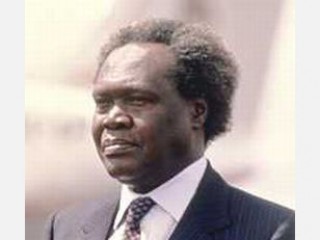
Milton Obote biography
Date of birth : 1925-12-28
Date of death : 2005-10-10
Birthplace : Akokoro, Uganda
Nationality : Ugandan
Category : Politics
Last modified : 2010-12-20
Credited as : politician, former Prime Minister of Uganda, and President of Uganda
Apolo Milton Obote (born 1925) was a Ugandan political leader who guided his country to independence in 1962. He worked to create a centralized government to replace the divided state left by the British, but his ruthless rule in the 1980s was marked by torture and repression and the killing of more than 100,000 civilians.
Milton Obote was born at Akokoro village in Lango territory in the northern part of the British Uganda Protectorate in 1925. He was the son of a poor local chief in the Lango tribe. He began his education in 1940 at the Lira Protestant Missionary School, continued it at Gulu Junior Secondary School and Busoga College, Mwiri, and finished it at Makerere College (1948-1950). Because the Buganda tribespeople who lived in southern Uganda dominated the economy, Obote went to Kenya to find work. He worked there first for an engineering firm and then for several industrial concerns. While in Kenya, he became interested in politics and was a founding member of the Kenya African Union.
In 1956 Obote returned to Uganda. He entered politics when he was asked to return to the Lango district to replace a local Uganda National Congress party leader who had been imprisoned. In 1958, a sudden vacancy caused by the resignation of the Lango member of the Legislative Council led to Obote's appointment as a replacement. In Uganda's first direct elections later that year, Obote won the seat by a wide margin, and his rise in Ugandan politics was under way.
Obote soon became president of the Uganda National Congress party, one of many parties trying to forge a unity to bring Uganda independence. In 1960, Obote joined his organization to a rival party, thus founding the Uganda People's Congress; he became its president. When a 1961 conference provided for elections leading to independence, Obote allied his party to the Buganda party under Kabaka (King) Yekka in order to defeat Benedicto Kiwanuka's ruling Democratic party. The coalition gained a majority of the Ugandan votes, and Obote became Uganda's prime minister. He presided over British withdrawal in October 1962.
But independence did not solve Uganda's problems. Buganda had been an ancient African kingdom, and British rule had left Buganda autonomous within the Uganda Protectorate. It was the most prosperous part of the country and home to Uganda's most educated elite. In accord with Uganda's constitution, agreed to by the British prior to independence, Obote appointed the ruler of Buganda to the largely ceremonial office of president of Uganda. But Bugandans were not willing to settle for less than a dominant place in the nation's politics, and Obote's alliance with Kabaka Yekka became increasingly unstable as friction grew between Buganda and the central government. The problem erupted into a crisis in 1966. Obote suspended the constitution, declared a state of emergency, and assumed full power. He introduced a new constitution, abolished Buganda and other kingdom-states within Uganda, and assaulted Kampala, the capital of Buganda under the leadership of General Idi Amin. The Bugandan king fled and died in exile in London.
In the late 1960s Obote tried to undermine the Bugandan economic power by moving the nation closer to socialism. In fact, he instituted authoritarian one-party rule but failed to unify the country. On Jan. 25, 1971, while Obote was out of the country on a diplomatic mission, Uganda's army under Amin ousted him from the presidency. Obote fled to Tanzania, and Amin for eight years instituted a bloody regime of terror and repression.
In 1979, an invasion aided by Tanzania overthrew Amin. After months of unsuccessful sectarian regimes, Obote won an election in 1980 which was widely believed to have been rigged. Obote's second regime continued Amin's terrorist tactics. Obote was opposed by the Bugandas, by the Acholi peoples of the north, and most importantly by a guerilla movement in the west, the National Resistance Army. Under Obote's direction, the Ugandan army tried to crush the guerillas by destroying entire villages and decimating the population. Amnesty International and other groups denounced Obote's police state and torture tactics, and he was charged with directing the killing of more than 100,000 civilians. In 1985, Obote was toppled in a coup and fled to Kenya. He was then granted political asylum in Zambia. His political career was over. Instead of being remembered as the leader of Uganda's independence movement, he left a legacy of totalitarianism and terror.
Obote's early career was chronicled in Ali Mazrui, Violence and Thought: Essays on Social Tensions in Africa (1968); A. J. Hughes, East Africa: Kenya, Uganda, Tanzania (1969). An earlier work on politics in Uganda was David E. Apter, The Political Kingdom in Uganda: A Study in Bureaucratic Nationalism (1961; rev. ed. 1967). A comprehensive history of Ugandan politics since independence and Obote's role is found in David Apter, "Democracy for Uganda: A Case for Comparison," in Daedalus (Summer 1995).
















